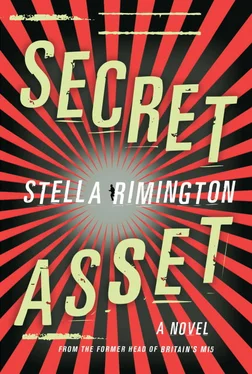From his lap Willis drew out a photograph and handed it to Eddie. It was an enlarged passport shot of a young Asian man with dark mournful eyes and a wispy attempt at a goatee.
“Do you remember him?” asked Willis.
“I’ll say,” said Eddie. How could he forget him? It was his first sale in almost two weeks; Symonson had started making the first of the grumbling dissatisfied noises that had recently approached a crescendo.
Then one morning a young Asian man had come in and started looking around, curtly rejecting the offers of two of the other salesmen for help. Eddie had therefore approached him tentatively, but the man had been receptive enough to let Eddie escort him around the cars in the forecourt, through the Peugeots and Fords and the two used Minis they had in stock, until suddenly the Asian stopped in front of the black Golf. Sixty-three thousand miles on the clock. In reasonable nick, though it could do with a respray.
Eddie had begun the spiel, but the Asian—unusually, since as a rule Eddie found those people very polite—had cut him off. “Spare me the bullshit,” he’d said. “What’ll you take for it?”
Eddie said to Willis now, “Yes, that’s the one. We haggled a bit over price, but in the end he seemed happy enough.” He wanted Symonson to feel he had handled the sale adroitly, but his boss’s expression remained indifferent. Eddie asked, “Why? Is there a problem?”
“Not with the car,” said Willis. Eddie looked at him more closely. Eddie had seen enough policemen over the years to know that, whatever Willis said, this was not your average copper.
Eddie said, “If he had a problem with the van, that’s his lookout. I warned him it was pretty iffy.”
There was silence in the room as Willis seemed to digest this. Finally Willis asked quietly, “What van?”
“The one he bought two days later. When I saw him come in I reckoned he’d had a problem with the Golf. Or just changed his mind—people often do that right after they buy a car. But no, he wanted a van as well. So I sold him one.”
“What make?”
“I think it was a Ford. It’ll be in the books.” He gestured towards Symonson. “But it was six years old, I remember that. White, of course. He insisted on climbing into the back to see how big it was. I got three and a half for it. I warned him about the transmission, but he didn’t seem to care.”
“Did he say what he wanted it for?”
“No.” The second time the young man called Siddiqui had been even terser than before, so Eddie hadn’t bothered trying to pitch.
“Did he say anything about where he might be going?”
Eddie shook his head. “He didn’t say much at all. No small talk. There’ll be a name and address in the books but he paid cash—both times.”
Willis nodded but Eddie could tell he wasn’t happy. “If there’s anything at all you remember about this man,” said Willis, “please give me a ring.” He took out his wallet and extracted a card, then handed it to Eddie. “That’s my direct line. Ring me any time.”
“Okay,” said Eddie, looking at the card. I’ll be damned, he thought, he is from DVLA after all. “Is that it?” he said, looking back and forth between Symonson and Willis.
It was Willis who spoke. “Yes,” he said. “Thanks for your help.”
As Eddie got up to go, Symonson said, “Will you be around later, Eddie? I need to talk to you.”
Where else does he think I’ll be? thought Eddie sourly. Honolulu? The Seychelles? “Yes, Jack,” he said, knowing full well what they would be talking about. “I’ll be here.”
Liz was surprised to learn that Tom lived in Fulham. She had thought that his flat was in North London, near her own place in Kentish Town. He hadn’t actually said as much, that evening when he dropped her off, but he’d certainly led her to believe that she wasn’t taking him out of his way.
Liz walked the two or three streets from the Underground station to Tom’s address, in a quiet, leafy backwater of uniform, red brick, semi-detached Edwardian houses, mostly divided into flats.
As she approached the front door, two A2 officers emerged as if by magic from a van parked further down the street. Liz recognised the tall broad figure of Bernie, an affable ex-Army sergeant she had worked with before. With him was Dom, his quieter sidekick, a short, wiry man, fit from running marathons. Dom’s expertise was locks—he had a vast collection in Thames House. He loved them; he studied them; he brooded over them, like an enthusiast with his stamp collection.
But Dom’s skills were not needed at first as the front door to the house was open and a cleaning lady, who had been mopping the tiled floor in the hall, was just leaving. She took no notice as they walked straight past her and up the stairs to the first floor where Tom lived. Bernie rapped sharply on the front door. They were confident from A4, outside watching the flat, that Tom wasn’t there, but no one wanted any surprises.
They waited a full minute, then Dom set to work. He picked the first lock in fifteen seconds, then struggled with the Chubb in the top corner of the door. “Bugger’s had it specially adapted,” he said. It took another three minutes before Dom grunted, pushed, and the door opened.
Liz hadn’t known what to expect, and her first impression was of overpowering neatness, an almost Germanic cleanliness. That and the light, which streamed through the front windows of the living room, highlighting the wooden floors, which had been waxed and polished to a sheen. The walls were white, reinforcing the sense of space, and the furniture was modern and looked new: Danish-style chairs and a long pristine white sofa. On the walls hung a few large bland prints in cold metal frames.
“Nice place,” said Bernie approvingly. “Has he got money of his own?”
Liz shrugged. Presumably Tom’s stepfather had left him something in his will. These were comfortable rather than lavish quarters, but it was an expensive part of town. It was hard to see how Tom could live here on his MI5 salary, especially as presumably he gave something to Margarita.
She followed Bernie and Dom into the other rooms: an alcove kitchen and dining area, two bedrooms in the back. Tom slept in the larger one; the spare bedroom was clearly used as a study—there was a small desk in the corner and a filing cabinet.
Bernie asked, “Do you reckon he was always this tidy, or did he clean up before he did a bunk?”
Liz ran a finger under the desk top and, raising it into the air, found no dust. “I think it’s always like this.”
“It’ll take about an hour,” said Bernie. He and Dom left Liz in the sitting room while they went to work, looking for hiding places: from the simple (lifting the cistern cover of the loo) to the complicated—checking the floorboards, and tapping the partition walls and the ceilings for hidden cavities. This was a preliminary search. Later, if necessary, the whole place would be taken to pieces.
Liz focused on what was visible, hoping it would tell her something new about the man she didn’t already know. Not that that’s a lot, she told herself. The flat had about as much personality as a hotel suite.
She went first to inspect Tom’s bedroom. There were a couple of suits and some jackets hanging from a rail in the cupboard. A chest of drawers held boxer shorts and socks, and a dozen crisp, cotton shirts, neatly folded, that had been washed and pressed by a commercial service.
So he dresses well, thought Liz. I already knew that. She looked at the tall oak bookcase set against one wall. Were books the key to a man’s mind or his heart? It seemed hard to tell. The reading was a mix of light fiction and heavier stuff—history and politics. Tom obviously liked thrillers, with a soft spot for the works of Frederick Forsyth. It seemed fitting, thought Liz, that Tom the lone wolf should own a copy of The Day of the Jackal.
Читать дальше












